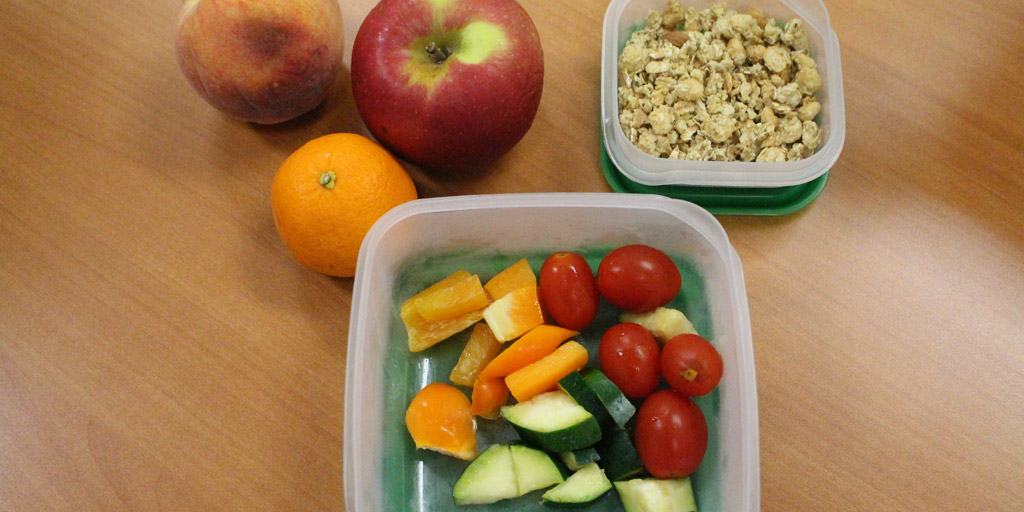Health and Fitness: Healthy eating on campus
 CREDIT: MELISSA NOVACASKA
CREDIT: MELISSA NOVACASKAEating healthy while on campus can be tricky, but there are definitely some key ways to eat well while spending long days at school.
Whether you carry a meal plan or you have long hours of classes, chances are you are going to order some food on campus once or twice. It really doesn’t matter which campus you are at as these basic principles can be applied on or off campus at local surrounding food vendors.
The principles are:
1. Choose the option with lots of vegetables.
2. Choose the option that is limited or has very little sauce that can be very sugary or salty.
3. Eliminate the processed foods.
4. Share large portions with a friend or have a plan to eat it later.
5. Make sure to get a balance of carb, fat: protein and a balance of vegetables, lean meats or protein plant products, fruit, healthy fats and whole grains.
6. Plan in advance so you don’t reach for unhealthy items.
You don’t need a nutrition degree to know the basic differences between something healthy and unhealthy.
I know it can be confusing sometimes with all the information spreading around on social media and the web about what to eat.
It can also be confusing when you are faced with a couple items that both seem to be equally unhealthy or healthy and trying to decipher which you should have.
It’s also really difficult when something unhealthy tastes really good or you walk by that wonderful aroma after sitting in class for a few hours on an empty stomach.
So how do you decide? Let’s look at each of the principles a little closer.
Filling up on fibre rich vegetables and fruit will help you feel full, hydrate you, make you regularly go two to three times daily of ideal, soft, s-shaped poop, lower blood sugar, give you energy, provides protein (especially when you eat skins) and even fat (i.e., olives and avocadoes). Make at least half of your plate or bowl vegetables and fruit.
That being said, when you go to a restaurant, they often try to make the vegetables and fruit taste better by adding toppings, dips and sauces. These are often really sugary, salty and provide very little value in terms of necessary vitamins and minerals. Choose plant-based oils/fats like olive, avocado, walnut, natural peanut butter, hummus, etc., lemon or lime juice, vinegar or balsamic vinegar plus herbs and spices to flavour, versus sugary tomato sauces, creamy/cheese sauces and sweetened dips and condiments.
Sauces are largely processed, meaning they are mass-produced and lots of things are added to make them taste better, but this does nothing for our health and waistline.
Another way you can eliminate processed foods is to “skip the bun”. This applies to all breads, baked goods, pastas, heavily processed cereals, crackers, bars, etc.
Skip the bun literally and ask for your sandwich/burger to be wrapped in lettuce or change it to a salad bowl. You can also have a veggie-based meal instead of pastas or white rice/minute rice by using greens, squash or potato as the base. Yes, I said potato. This is a better alternative than the processed options.
Keep your portions in check and make sure you don’t go over two to two-and-a-half handfuls of food in one sitting. Share portions with a friend or bring a take-home container and save for later.
Since so many of our foods are a mix of carbs, fat and protein it’s hard to know how much you are getting of each. Generally speaking, a good ratio to follow is 40 to 50 per cent of carbs, 20 to 30 per cent of fat and 20 to 30 per cent of protein each day.
To put that into easy-to-see terms: make half your plate vegetables/ fruit, a one to four or less of whole grains, a quarter to one third of meat or high protein plants like beans and one eighth to a quarter of healthy plantbased fats.
Check out all the options on campus and be prepared with some healthy snack you prepared for yourself or bring from the grocery store.
Make a weekly plan and write out your meals to ensure balance so you are not left wondering what to eat.
Register online for Fanshawe’s Student Wellness Centre’s Healthy Eating on Campus seminar on Sept. 26 at 6 p.m. Bring your dinner!
For more information on this event as well as the healthy eating on campus presentation visit studentwellnesscentre.ca.














